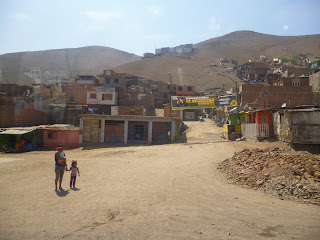 |
| The shanty town of Pachacutec |
The community of Pachacutec is estimated to be around 250,000 people and is growing all the time as more and more people arrive. There is often no space to build more houses so wooden houses are built on the sides of steep sand dunes or further and further out into the inhospitable desert. Although the majority have electricity (70%) there is very little water or sewage services. Usually water is brought into the shanty town a few times a week by a big lorry and the sewage is buried on the outskirts of the town. The town is made of poorly constructed shacks made of anything that can be used to make walls and a roof: cardboard, corrugate iron, plastic sheeting and wood. Because of the extreme poverty in which the people live, crime and drug abuse is rampant as well as other social problems like domestic abuse, high infant mortality and teenage pregnancy.
 |
| No roads and very little electricity or clean water |
To get to Pachacutec we had to cross the city of Lima which, with all the traffic, was a bit of a difficult experience. Eventually we reached the outskirts of the city and the shanty towns. Often there was no road just a dirt track and so the going was slow and bumpy! We drove along the dusty track through the shanty towns passing wooden shacks and dodging stray dogs. Finally, we arrived outside the small wooden church where the Sunday School children were waiting for us. As soon as the bus came within sight the children ran out to meet us, waving and shouting hello, desperate to see what we'd brought them. It was a very humbling experience.
 |
| The Sunday School children of Pachacutec |
Our time at Pachacutec came to an end too fast and all too soon we were back in the bus and heading back along the bumpy, dusty track to Lima. I couldn't help thinking that I was the lucky one escaping back to my idea of civilisation where I had so many things these people had never seen: running water, a permanent and stable roof over my head and many of the other things that I take for granted all the time. Those I'd met in Pachacutec didn't have the luxury of escaping their situations. I will probably never realise just how fortunate I am but that day I saw a depth of poverty I'd never seen before and will never forget. I learned so much from the experience but most of all I realised that what I have is not mine to hoard: it has been given to me as a blessing from our Heavenly Father to share with whoever might need it. Around us is always someone is need, someone to whom we can stretch out a helping, loving hand.
 |
| Just one of many sprawling shanty towns which stretch as far as the eye can see |
No comments:
Post a Comment